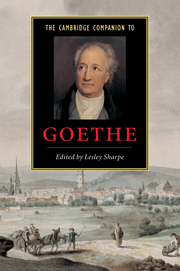Book contents
- Frontmatter
- Introduction
- 1 The world Goethe lived in
- 2 Goethe the writer and literary history
- 3 Goethe the poet
- 4 Goethe the dramatist
- 5 Faust
- 6 Weimar Classicism
- 7 Goethe and the Weimar theatre
- 8 Goethe’s prose fiction
- 9 Autobiographical writings
- 10 In defence of experience
- 11 Goethe and gender
- 12 Goethe and the visual arts
- 13 Goethe and the political world
- 14 Religion and philosophy
- 15 Reception in Germany and abroad
- A guide to further reading
- Index
10 - In defence of experience
Goethe’s natural investigations and scientific culture
Published online by Cambridge University Press: 28 May 2006
- Frontmatter
- Introduction
- 1 The world Goethe lived in
- 2 Goethe the writer and literary history
- 3 Goethe the poet
- 4 Goethe the dramatist
- 5 Faust
- 6 Weimar Classicism
- 7 Goethe and the Weimar theatre
- 8 Goethe’s prose fiction
- 9 Autobiographical writings
- 10 In defence of experience
- 11 Goethe and gender
- 12 Goethe and the visual arts
- 13 Goethe and the political world
- 14 Religion and philosophy
- 15 Reception in Germany and abroad
- A guide to further reading
- Index
Summary
Goethe's views on the systematic investigation of nature were informed by his belief that science once developed out of poetry, and that one day these two human faculties might well meet again to their mutual advantage (cf.HA XIII, 107). Against the background of this belief, his own contributions to the study of organic form and transformation (morphology), to optics and the science of colour, to geology and mineralogy, and to meteorology must be seen as an attempt to maintain the unity of human knowledge and experience, and the unity of humankind and nature. He differed from the more speculative of the Romantics through his insistence on empirical evidence and demonstration, and from the positivist tendency of the emerging natural sciences through a highly developed consciousness of theoretical issues. This chapter portrays the specific nature of Goethe's natural investigations, concentrating on morphology and the theory of colour as the most important areas of his activities. It will argue that, ultimately, the relevance to us of Goethe's scientific activities lies in methodological issues rather than individual results. His balancing of analytical and synthetic procedure makes it possible to extract elements from the totality of nature without losing sight of its unity. Goethe insists on a continuous dialogue between experience and theoretical abstraction, and on the phenomena themselves providing the true teachings of nature. This is a necessary corrective to the idea that scientific theories are the expression of something more fundamental than the phenomena themselves. The indivisible association of knowledge and respect for the object of knowledge is at the heart of Goethe’s approach.
- Type
- Chapter
- Information
- The Cambridge Companion to Goethe , pp. 160 - 178Publisher: Cambridge University PressPrint publication year: 2002

